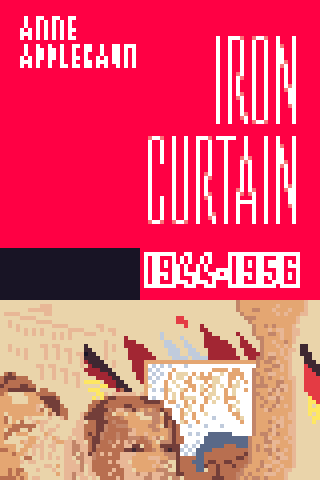Iron Curtain — The Crushing of Eastern Europe

This book talks about the overall progression of the Soviet incursion into the Eastern European countries starting in the years before the second world war. It focuses mostly on Hungary, Poland and Eastern Germany. Myself being from ex-Czechoslovakia, most of these stories were new.
The history shows that in so many words, there was never any “liberation” effort from the side of the Soviet union. Expelling of German troops from the eastern territories was just an opportune excuse to execute an invasion plan, devised well before the end of the war.
One thing I’d criticize about the book is that, especially in the opening part, it downplays the complicity of the West in this effort. Molotov non aggression pact is talked about, but without the political context in which it was written. Munich pact is not mentioned. It has to be reiterated that the west hoped until the very end that Hitler would first attack the soviet union which would deal with one of their “problems”.
Throughout the book, the “communist ideology” is denigrated but it remains undefined. It is conflated with totalitarianism, which is in turn defined in detail.
Eventually the author does mention western complacency to Soviet control.
Random notes
I chuckled when stories about kids running around yelling “Давай часы”, pretending to be Russian soldiers. I remember these jokes from my childhood.
Chapter 6 shows the shortcomings of fighting “against” rather than “for” something. Fighters back then, as often as they do now, defined themselves by their enemy rather by their end goal. Polish resistance cells described themselves as “anti fascist” and nothing else. This led to internal discord when it was necessary to align themselves to fight the new enemy: the soviets. Ultimately the bickering let to their demise.
The Soviets meticulously eliminated any trace of nationalism in all invaded countries. Unfortunately I think this was also a survival tactic, at the same time the CIA was organizing one coup after another in South America and elsewhere. Notably, all of this was also happening while the west just watched; and all of this was before the soviets had the bomb.
Chapter 8 talks about the importance of control of the radio. Soviets have correctly identified it as the most important medium. Lesson to learn is that we need to protect the free internet. While internet is harder to fully control due to its more decentralized nature, the current attacks try to undermine its value by filling it with garbage.
What is the difference between a renaissance painter, an impressionist and a socialist realist?
Renaissance painter paints what he sees. An impressionist paints what he feels. A socialist realist paints what he’s told to.